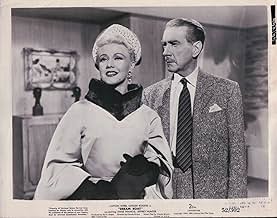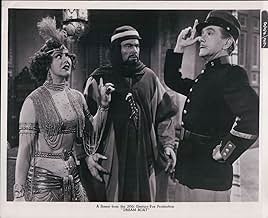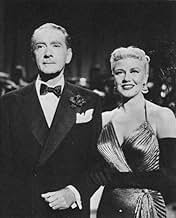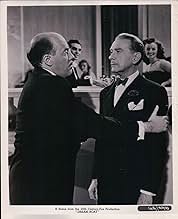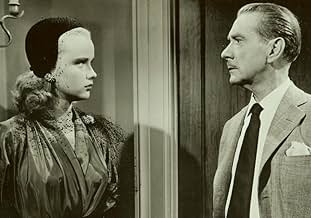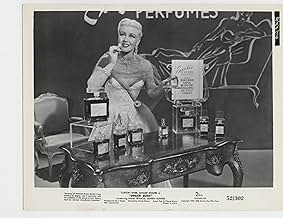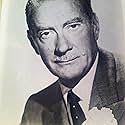IMDb RATING
6.6/10
1K
YOUR RATING
Respected college professor Thornton Sayre is plagued when his old movies are shown on TV, and sets out with his daughter to stop it. However, his former co-star is the hostess of the TV sho... Read allRespected college professor Thornton Sayre is plagued when his old movies are shown on TV, and sets out with his daughter to stop it. However, his former co-star is the hostess of the TV show playing his films, and she has other plans.Respected college professor Thornton Sayre is plagued when his old movies are shown on TV, and sets out with his daughter to stop it. However, his former co-star is the hostess of the TV show playing his films, and she has other plans.
Abdullah Abbas
- Tavern Patron
- (uncredited)
Jay Adler
- Desk Clerk
- (uncredited)
Richard Allan
- Student
- (uncredited)
Howard Banks
- Hotel Clerk
- (uncredited)
George Barrows
- Commandant in Silent Movie
- (uncredited)
Lulu Mae Bohrman
- Restaurant Patron
- (uncredited)
John Breen
- Man in Lobby
- (uncredited)
Jimmy Brooks
- Gloria's Backup Singer
- (uncredited)
- Director
- Writers
- All cast & crew
- Production, box office & more at IMDbPro
Featured reviews
Clifton Webb is "Dreamboat," in this 1954 film. Webb plays a silent film star named Bruce Blair who is now a college professor under what one assumes is his real name, Thornton Sayre.
All is well until his silent films begin to appear on that new popular medium, television, and hosted by his former co-star (Ginger Rogers).
The college board calls for his resignation, so Sayre goes to New York with his brainy daughter (Anne Francis) to get an injunction to stop the televising of his old films.
Webb was an underrated actor who could do the acerbic queen beautifully, but one forgets he was also a gifted comedian and a moving dramatic actor - "The Man Who Never Was" and "Titanic" being two prime examples of his capabilities. He also was a trained opera singer, something the New York theater audiences, alas, only got to hear.
In "Dreamboat," his silent film character is a cross between John Gilbert, Rudolph Valentino and Douglas Fairbanks, Jr., and Webb does a terrific job overplaying the silent film acting.
Ginger Rogers is wonderful as the glamorous, conniving ex-costar, Gloria Marlowe, but I have to agree with one comment, that the two stars had little chemistry. The role was originally offered to Marlene Dietrich - she and Webb might have been quite funny together.
Anne Francis is the plain Jane daughter in an early role, and Jeffrey Hunter is the gorgeous Bill Ainslee in an early role for him, a man assigned by his agency boss (Sam Levitt) to escort Francis around town. They make a great couple; both appeared in the 1965 programmer 'Brainstorm' to excellent effect.
By that time, their studio days were over; Hunter's film career had disintegrated, and Francis would have her most of her career in television. They both still looked fabulous, though.
Very, very entertaining. Highly recommended.
All is well until his silent films begin to appear on that new popular medium, television, and hosted by his former co-star (Ginger Rogers).
The college board calls for his resignation, so Sayre goes to New York with his brainy daughter (Anne Francis) to get an injunction to stop the televising of his old films.
Webb was an underrated actor who could do the acerbic queen beautifully, but one forgets he was also a gifted comedian and a moving dramatic actor - "The Man Who Never Was" and "Titanic" being two prime examples of his capabilities. He also was a trained opera singer, something the New York theater audiences, alas, only got to hear.
In "Dreamboat," his silent film character is a cross between John Gilbert, Rudolph Valentino and Douglas Fairbanks, Jr., and Webb does a terrific job overplaying the silent film acting.
Ginger Rogers is wonderful as the glamorous, conniving ex-costar, Gloria Marlowe, but I have to agree with one comment, that the two stars had little chemistry. The role was originally offered to Marlene Dietrich - she and Webb might have been quite funny together.
Anne Francis is the plain Jane daughter in an early role, and Jeffrey Hunter is the gorgeous Bill Ainslee in an early role for him, a man assigned by his agency boss (Sam Levitt) to escort Francis around town. They make a great couple; both appeared in the 1965 programmer 'Brainstorm' to excellent effect.
By that time, their studio days were over; Hunter's film career had disintegrated, and Francis would have her most of her career in television. They both still looked fabulous, though.
Very, very entertaining. Highly recommended.
Clifton Webb at his most stuff-shirtish is the life of this takeoff on swashbucklers and television commercials. Even today these eerily seem to foreshadow the commercials still shown (only usually in color.) with their pointless animations and annoying voices uttering gross exaggerations.
Ginger Rogers, here without Fred Astaire, proves herself quite a good farceuse as Webb's nemesis, Anne Francis is good as Webb's daughter and Jeffrey Hunter, some years before playing Jesus in "King of Kings" (also known humorously as "I was a Teenage Jesus" because of his youthful looks, even if he was close to the right age) played opposite Miss Francis.
Other reliable character players included Elsa Lanchester, Fred Clark and Ray Collins.
The film was brilliantly directed by Claude Binyon from his own sharp script based on a story by John D. Weaver.
Ginger Rogers, here without Fred Astaire, proves herself quite a good farceuse as Webb's nemesis, Anne Francis is good as Webb's daughter and Jeffrey Hunter, some years before playing Jesus in "King of Kings" (also known humorously as "I was a Teenage Jesus" because of his youthful looks, even if he was close to the right age) played opposite Miss Francis.
Other reliable character players included Elsa Lanchester, Fred Clark and Ray Collins.
The film was brilliantly directed by Claude Binyon from his own sharp script based on a story by John D. Weaver.
By the title, I was expecting a slice of romantic nonsense from Hollywood's younger crowd. Instead, the movie's a sharply written, cleverly mounted satire of the early days of television. In short, the film turned out to be an unexpected sleeper. Now ordinarily, Webb's snooty epicene characters don't appeal to me. Here, however, he plays it fairly straight as a college professor with a past he's trying to live down. The trouble is his ridiculous old silent films keep turning up on program-starved TV, much to the haughty prof's embarrassment.
Credit the quality to writer-director Binyon who sometimes showed flashes of brilliance in what appears an otherwise checkered career. And here I thought Frank Tashlin was the first moviemaker to mine TV's rich lode of absurdity. I love it when the professor turns channels randomly in the courtroom, and each channel is programming something ridiculous, including his old movies. It's hilarious. It's also hard to know how much things have changed since then, especially with the commercials.
The rest of the storyline is entertaining but nothing special. I enjoyed seeing a very young Ann Francis who makes a surprisingly good nubile academic. Too bad, however, there's not more of the delicious Elsa Lanchester. Her amorous moves on Webb amount to one of ditzy pairings of the decade. Then there's that clever tie-in at the end, helping make this 90-minutes of obscure, unexpected delight. Too bad the movie wasn't served by a more appropriate title.
Credit the quality to writer-director Binyon who sometimes showed flashes of brilliance in what appears an otherwise checkered career. And here I thought Frank Tashlin was the first moviemaker to mine TV's rich lode of absurdity. I love it when the professor turns channels randomly in the courtroom, and each channel is programming something ridiculous, including his old movies. It's hilarious. It's also hard to know how much things have changed since then, especially with the commercials.
The rest of the storyline is entertaining but nothing special. I enjoyed seeing a very young Ann Francis who makes a surprisingly good nubile academic. Too bad, however, there's not more of the delicious Elsa Lanchester. Her amorous moves on Webb amount to one of ditzy pairings of the decade. Then there's that clever tie-in at the end, helping make this 90-minutes of obscure, unexpected delight. Too bad the movie wasn't served by a more appropriate title.
Clifton Webb is in top form here as a college professor who starred in old silent films. His past resurfaces when the old movies are shown on TV and he becomes the "Dreamboat."
This is a deftly amusing film in which Hollywood is poking fun at the silliness of its arch-rival of the 1950s, TV. It also pokes fun at its own early days of silent melodrama.
The film is an enjoyable experience overall, but especially delicious is Webb as the prim professor who is also the soap-opera film star of old Hollywood.
This is a deftly amusing film in which Hollywood is poking fun at the silliness of its arch-rival of the 1950s, TV. It also pokes fun at its own early days of silent melodrama.
The film is an enjoyable experience overall, but especially delicious is Webb as the prim professor who is also the soap-opera film star of old Hollywood.
When it first appeared, Dreamboat hit the mark with Sid Caesar-like precision. The old old movies were still floating around the smaller channels, and it was not unusual to find the TV screen filled with the histrionics of Valentino, Pola Negri, among others. Today, their existing work can be found, occasionally on TCM. Dreamboat was an absolute 'hoot' in its initial release, and Webb and Rogers were every bit as wacked-out funny as Caesar and Coca in a TV sketch about silent movies. Today, Deamboat may seem a little obscure, perhaps, but its broad and zany humor will still be there. One hopes that someone somewhere decides it is time to produce that elusive DVD release of this film (which includes an adorable Anne Francis, one of those underrated stars who deserves special attention).
Did you know
- TriviaThe scenes at the end which are supposedly from Bruce Blair's "new" movie are actually scenes from Bonne à tout faire (1948), the first of Clifton Webb's Mr. Belvedere trilogy. The theater marquee correctly identifies the film as "Sitting Pretty", blurring the line between real-life actor Clifton Webb and his actor character Bruce Blair in this film.
- GoofsWhen Miss Marlowe's cab arrives at her "real" hotel after she leaves the flophouse, the headlights are off (probably to reduce glare), but when the angle changes the lights are back on.
- Quotes
Gloria Marlowe: You ungrateful, untalented hypocrite.
- ConnectionsFeatures Bonne à tout faire (1948)
- SoundtracksYou'll Never Know
(uncredited)
Music by Harry Warren
Lyrics by Mack Gordon
Performed by Ginger Rogers and others at the nightclub
- How long is Dreamboat?Powered by Alexa
Details
- Runtime
- 1h 23m(83 min)
- Color
- Aspect ratio
- 1.37 : 1
Contribute to this page
Suggest an edit or add missing content


